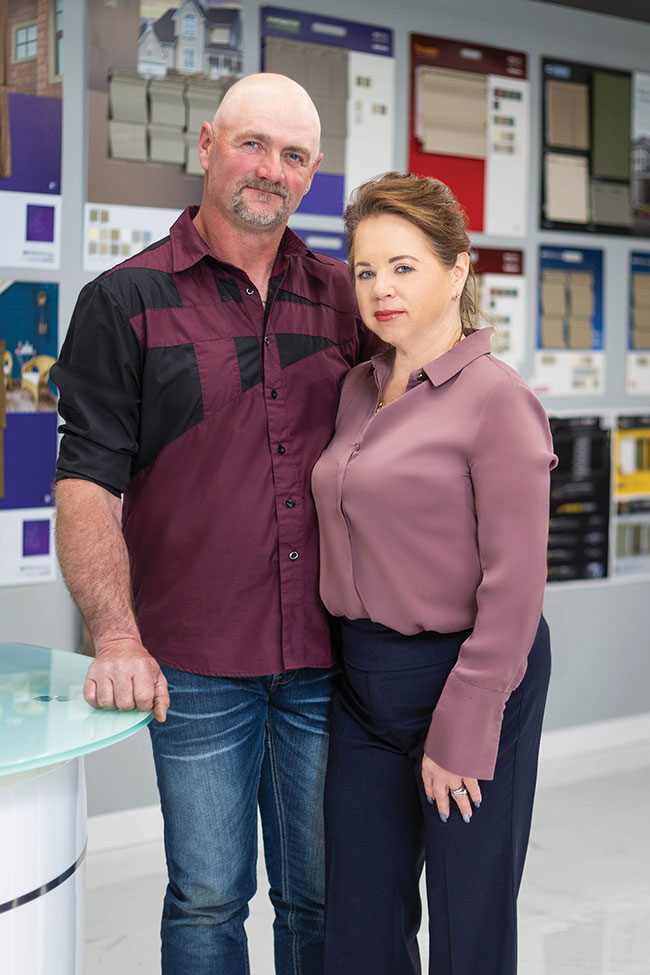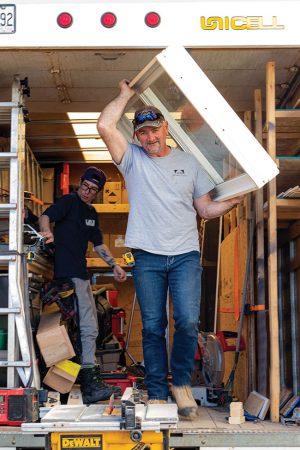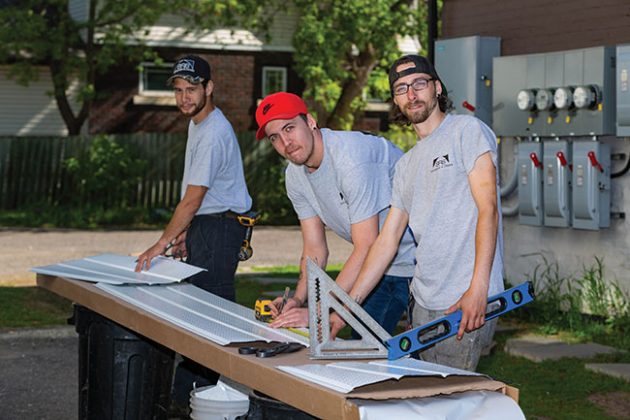
Articles
Business Intelligence
Dealer’s Corner
If you can dream it…
SRS Windows and Doors discusses the good, bad and the COVID
July 15, 2021 By Carroll McCormick
 Tamara Sheedy (right) founded SRS Windows and Doors so that husband Sean (left), who has long experience in the industry, could take up greater challenges.
Tamara Sheedy (right) founded SRS Windows and Doors so that husband Sean (left), who has long experience in the industry, could take up greater challenges. It has been a wild ride running a business during the COVID-19 pandemic, but Thunder Bay, Ont.,-based SRS Windows and Doors has remained upright in the saddle with barely any downtime.
Looking forward, though, insane material price increases, supply chain disruptions and hiring challenges will long outlast the pandemic, predicts SRS founder, Tamara Sheedy.
“For certain, non-essential jobs, we were locked down. However, we were closed for only two weeks. We had enough essential work to do to keep us busy,” Sheedy says, referring to the provincial rules that permitted some companies to operate throughout the pandemic and kept others closed.
Projects that have kept the company’s two crews hopping include installing 105 windows in the Sioux Lookout Pre- and Post-Natal Development – a block of 30 short-term apartments for expectant mothers from First Nations communities, and a senior housing development in Atikokan, two hours west of Thunder Bay.
“My guys just returned from a two-week stint at Atikokan. They were working with the builder CGV Builders Design Build Contractors, doing a senior housing complex. They installed 74 windows and 38 doors in two weeks. I’m pretty proud of them,” Sheedy says.
Taking up new challenges
Sheedy founded SRS in 2008 as a way to open new doors for her husband Sean, with long experience in the windows and doors trade, to bigger challenges. “My husband was working for a competitor, and he’d gone as far as he could with them after almost 19 years. I decided to open a company of our own. He had so much more to offer the industry,” Sheedy says.
Sheedy worked hard to train herself for the challenge of launching a new business. Adding to her previous work experience, she put herself through a two-year private college program with a specialization in business administration and accounting. She applies her skills to the business end of the company while Sean, she explains, “works in the installation aspect of it, handling warranty callouts and special installs – the physical end of it.”
One of their sons also works with the company. The three, plus six other employees, make a solid team. Most are Fenestration Installation Technician-certified through SAWDAC’s Window Wise program. (Sheedy is a SAWDAC board member.)

Major projects have kept the crews of SRS busy throughout the pandemic.
Options and choices
SRS purchases all the major brands that have Energy Star-rated products, for residential, commercial, institutional, industrial and retrofit projects. “We are a dealer offering supply only or supply and install. If we do windows that have to be assembled on site, like bay windows, we order parts and pieces and, with Sean’s vast experience, assemble what is needed to fit the bill,” Sheedy says.
“All of our windows are custom sizes. Generally, they are retrofitted, so they are built to order. Doors are standard sizes, but we do custom doors as well,” she says, adding that their mantra is “If you can dream it we can probably build it.”
One window, for example, called for fixed casements with a rounded top. “The manufacturer said they could not build it, so we got on a plane and flew down to Toronto to our manufacturer. Sean showed them how,” Sheedy says.
Sheedy studies the trends to learn what is hot in window and door fashions. Lately, she says, wood is out, and colours are in. “Black is a very hot colour,” she says. “We have a lot of call for coloured windows; for example, one of our manufacturers has 78 colours to choose from. If we don’t have the colour, give us a sample and we will send it off to the manufacturer and they will paint it. But most [requested] are straight-up white windows.
“Wood is not a high-ask window. Some manufacturers have the option of choosing different wood finishes, but with COVID, some used up their stocks and have dropped those options. They are sticking to the traditional best sellers.”
Sheedy’s goal is to offer customers good products and good service. “We offer a premium, high-end product. We are mostly using [Toronto-based] Vinyl Windows Designs, with lifetime warranties on parts, except screens and paint. We also offer a five-year warranty on installation. We were the first in Thunder Bay to do that. Now, most other dealers and installers offer a five-year warranty too.
“I come to my customers from the get-go with honesty, integrity, no bullshit, no hard sale – just soft sell,” she says.
The company also helps with design and layout issues, Sheedy adds. “A lot of customers talk to Sean. He will offer his opinion, but when they go onto colours and design, he tells them, “You need to talk to my wife.”
SRS brings a solid knowledge of the National Building Code and its provincial variations to the table. Says Sheedy: “On the building code there are a lot of loops, back talk and crevasses. Take egress windows: Builders will put through an awning as an egress window, but it is not. Builders sometimes state that a window meets egress standards that does not.”
One problem she encounters in Ontario is a certain disconnect between building permits and building codes. “Building permits are only required by municipal by-law, not the Ontario Code; [for example] that no permit is required if same-size or smaller windows are retrofitted. I went into a house once where the owners wanted to change the windows. None of them opened. The contractor had put fixed windows into every single opening in the house,” Sheedy says.
“This needs to change. It can put a lot of people in a precarious situation,” she adds.

Tamara, Sean, one of their sons as well as six other people together make up the successful SRS team.
Feeling the supply pain
Speaking of precarious, the pandemic has, while inspiring a home renovation stampede, wreaked havoc with supply chains and costs. “The price increases and supply chain issues are not funny anymore. People call and ask when our product will arrive, but we have no idea. There are price increases every day. Lumber has gone up about 400 percent in the past year. Steel has gone up almost 200 percent since early 2020. Transportation costs have also gone up significantly,” Sheedy says.
Contractors, and dealers like SRS, are eating some of these added costs. Take that senior housing development in Atikokan. “The roof cost $15,000 more today than when they bid on the job. That’s a $15,000 hit. We were awarded [our] contract before the pandemic hit. Thank God that as soon as we got the letter of intent we sent it to the manufacturer and the price was locked in, but my transportation cost was $3,700, an increase of 37 percent,” Sheedy says.
“We hope prices will level out, but customers are willing to pay, and manufacturers see that they will pay, so why would the prices come down? If anything, the prices will continue to go up.
“Because of the increase of the cost of everything we are carrying less stock because we don’t know what people will want. A lot of companies are going to have almost no stock. These days, people are sitting down with builders and architects to get help designing their homes. We don’t know what their intent is.”
Side-effects of COVID
A side effect of the federal government’s COVID assistance, in Sheedy’s experience, is that too few are hungry enough to get out and work. “Last year it was the worst because of COVID. People are getting money to sit on their tuchuses at home. Finding staff this past year and a half has been ludicrous.” One person she offered work to declined, saying, “I have things to do at home.” Another said, “I’m reading a book.”
“My guys have been working day and night, and good for them. But we are ramping up; protocols are in place. We are entering another summer where we can’t find the help we need. We would like to put a third truck on the road this summer. Finding anyone who wants to come off their benefits is hard,” Sheedy explains.
The strength of a woman
This makes it all the more exasperating for Sheedy that women are not taken more seriously in the trades. “Most construction companies are founded and led by men. This company was founded by a woman who is First Nations. Is it significant? You’re damn right. There are not enough of women in skilled construction trades besides doing [the] shoddy jobs.”
Sheedy encounters some shocking attitudes. Once, she recounts, “My husband was working on a construction site and met the owner. There were questions to ask, and my husband called me. I drove down and the owner came up to me and said, “Go sit in the truck, sweetheart. Let the men talk.” The man continued to talk over my head to my husband until Sean said that I was called in specifically to answer the questions.
“It is unbelievable to meet a male mentality that women have no business in construction. That is why it is very important to me that I am a woman, and Indigenous, leading this company. I strongly feel that there should be more women in construction and in the trades. It should not be just a man’s world.”
Print this page